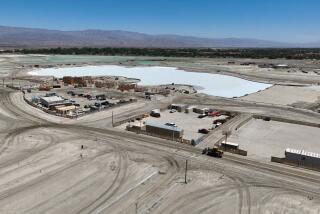Tribe, Caesars to Build Casino in Palm Springs
The Indian tribe that owns much of the land in Palm Springs announced Tuesday that it has selected Caesars World Inc. to build a $20-million casino, thus bringing high-stakes gambling to the desert resort.
In a joint statement, Caesars and the Agua Caliente tribe said the 80,000-square-foot complex will have restaurants, stores and entertainment facilities in addition to the casino, to be built on a site not yet selected.
The two parties said the gambling will include card games, paper pull-tabs similar to lottery scratch-off games and bingo, along with off-track betting and any other wagering authorized in a compact negotiated with the state. That could include slot machines and blackjack if a coalition of California tribes wins pending litigation with the state.
“We’re putting up a facility that will house those games currently permitted,” said Roger Lee, Caesars’ chief financial officer.
The venture, which does not include a hotel, is the first for Caesars on Indian land, where gambling has burgeoned into a multibillion-dollar business in recent years. “We think it’s an outstanding location,” Lee said.
Indeed, since court decisions began giving tribes competitive advantages in gambling a decade ago, California’s Coachella Valley has been the prized target for gambling promoters, perhaps the one place in the country where tribal-owned property had the potential to become another Las Vegas.
But the traditionally cautious Agua Caliente band of Cahuilla Indians--many already rich from land holdings--have been prominent holdouts to gambling. “We don’t need it,” one Agua Caliente member said last year, “and we don’t want it.”
In a stunning turnaround, however, the Agua Calientes voted early this year to rescind their gambling ban and in February formed a committee to screen the many outsiders who are offering proposals, tribal Chairman Richard M. Milanovich said.
Tribal officials said the move reflected uneasiness about the sagging Palm Springs tourist industry and a desire to help younger members who don’t have the land allotments that made others wealthy.
“There are a few members that have a Rolls-Royce,” tribal historian Anthony Andreas said. “But others are on welfare.”
Although Caesars was selected after a nine-month review, the two parties still must work out details of a seven-year management agreement.
Milanovich said the tribe took so long because it wanted a first-class establishment.
“I think that it’s a very big thing . . . hopefully to show we did not select a fly-by-night operation,” he said.
Many residents of the conservative region have been apprehensive about a tribal gambling project, over which city government has no say. But the business community has been generally receptive, hoping that gambling will boost a tourist trade that has been hurt by the recession and competition from newer resorts up the valley, in communities such as Rancho Mirage and La Quinta.
Milanovich said the new complex will require 750 to 1,000 employees and the entertainment facilities will probably seat several thousand. It is expected to take 18 months to complete the project.
One possible site is the historic Spa Hotel on tribal property downtown, built atop the mineral hot springs that gave the city its name. The Palm Springs Convention Center and many leading hotels are also on land owned by the tribe or its members.
“It shows what the future of the whole Coachella Valley is,” gambling expert I. Nelson Rose said of Tuesday’s announcement. “Palm Springs has such a worldwide reputation, this could make it a true destination resort for gaming as well as recreation.”
Rose, a professor at Whittier Law School, noted that nearby Desert Hot Springs was one of two California communities to approve card clubs in this month’s election, while six other locations turned down gambling proposals. Also contributing to the growing role of gambling in the area are existing casinos on the Morongo and Cabazon reservations.
The Agua Caliente project would be distinct from most Indian gambling facilities, which are on remote, rural reservations.
“It definitely can be a success, but it’s much more dangerous than any other Indian gaming site virtually anywhere in the country,” Rose said. “Unlike the other sites, it is a resort but it also is an urban area . . . You have to take more precautions against children gambling and compulsive gambling.”
As proposed, the project will rival the largest Indian gambling facility in the state, the 55,000-square-foot Sycuan Gaming Center in San Diego County.
The profitability, however, may hinge on the status of slot-type gambling machines, which account for about 60% of the net at most full-fledged casinos.
California officials say the devices are illegal, but more than two dozen tribes have petitioned to have them allowed under the compacts mandated by federal legislation. A hearing on the dispute is scheduled for next month in federal court in Sacramento.
More to Read
Inside the business of entertainment
The Wide Shot brings you news, analysis and insights on everything from streaming wars to production — and what it all means for the future.
You may occasionally receive promotional content from the Los Angeles Times.










